PRENATAL VITAMINS/MINERALS/OMEGA-3 FATTY ACIDS - ORAL
PHONETIC PRONUNCIATION:
GENERIC NAME(S): prenatal vitamins no.11/ferrous fumarate/folic acid/omega-3
Uses
USES: This medication is a multivitamin, mineral, and fatty acid product used to treat or prevent vitamin deficiency before, during, and after pregnancy. Vitamins, minerals, and fatty acids are important building blocks of the body and help keep you in good health. This combination product also contains iron and folic acid. Women of childbearing age should maintain adequate levels of folic acid either through diet or supplements to prevent infant spinal cord defects in the developing baby.
How to use PRENATAL VITAMINS/MINERALS/OMEGA-3 FATTY ACIDS - ORAL
HOW TO USE: Take this medication by mouth, usually once or twice daily or as directed by your doctor. Follow all directions on the product package, or take as directed by your doctor. If you are taking the powder form of this medication, mix in water as directed before swallowing. If you are taking the delayed-release form of this medication, do not crush or chew. Doing so can release all of the drug at once, increasing the risk of side effects. If you are taking the chewable form of this medication, chew thoroughly and then swallow. This medication is best taken on an empty stomach 1 hour before or 2 hours after meals. Take with a full glass of water (8 ounces or 240 milliliters) unless your doctor directs you otherwise. If stomach upset occurs, you may take this medication with food. Avoid taking antacids, dairy products, tea, or coffee within 2 hours before or after this medication because they will decrease its effectiveness. Do not lie down for at least 10 minutes after taking this medication. Consult your doctor or pharmacist for details for your particular brand. Take this medication regularly in order to get the most benefit from it. To help you remember, take it at the same times each day.
Side Effects
Precautions
Interactions
Overdose
Images

- color
- multi-color (2)
- shape
- oblong
- imprint
- AP 84

- color
- multi-color (2)
- shape
- oblong
- imprint
- AP 84
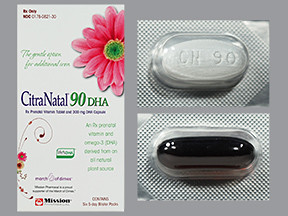
- color
- multi-color (2)
- shape
- other
- imprint
- CN 90, 0821
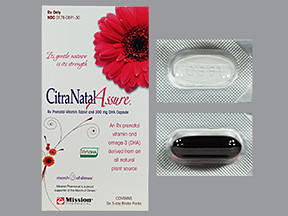
- color
- multi-color (2)
- shape
- other
- imprint
- 0891
Reviews
Faq for PRENATAL VITAMINS/MINERALS/OMEGA-3 FATTY ACIDS - ORAL
Prenatal vitamins are dietary supplements specifically formulated to provide essential nutrients that are important for a healthy pregnancy. They often contain higher levels of vitamins and minerals such as folic acid, iron, calcium, and vitamin D.
Prenatal vitamins are important because they help meet the increased nutritional needs of the mother and support the healthy development of the growing baby. They help reduce the risk of certain birth defects, support bone health, and ensure proper growth and development.
It is recommended to start taking prenatal vitamins at least one month before trying to conceive, or as soon as you find out you are pregnant. This helps ensure that your body has the necessary nutrients to support a healthy pregnancy from the very beginning.
It is generally recommended to take prenatal vitamins instead of regular multivitamins during pregnancy because they contain higher levels of certain nutrients that are important for fetal development. Regular multivitamins might not have adequate amounts of folic acid, iron, or other necessary nutrients.
Prenatal vitamins are generally safe to use and considered well-tolerated. However, some women may experience side effects like constipation, nausea, or upset stomach. If you are experiencing severe or persistent side effects, it is recommended to consult with your healthcare provider.
It is always important to consult with your healthcare provider before taking additional supplements along with prenatal vitamins. Some supplements, such as herbal remedies or high-dose vitamin E, may not be safe during pregnancy and could potentially interact with prenatal vitamins.
Omega-3 fatty acids, specifically docosahexaenoic acid (DHA) and eicosapentaenoic acid (EPA), are crucial for the development of the baby's brain and eyes. They also have benefits for the mother, including reducing the risk of preterm birth and postpartum depression.
Some prenatal vitamins may already contain omega-3 fatty acids, but it's important to check the label to make sure. If your prenatal vitamins do not contain omega-3 fatty acids, your healthcare provider may recommend taking separate DHA supplements or fish oil capsules.
While a healthy diet is important during pregnancy, it can be challenging to get all the necessary nutrients solely from food. Prenatal vitamins help bridge any nutritional gaps and ensure that both the mother and baby are getting all the essential nutrients required for optimal health.
Warning
WARNING: Accidental overdose of iron-containing products is a leading cause of fatal poisoning in children younger than 6 years. Keep this product out of reach of children. If overdose does occur, seek immediate medical attention or call a poison control center.
Disclaimer
IMPORTANT: HOW TO USE THIS INFORMATION: This is a summary and does NOT have all possible information about this product. This information does not assure that this product is safe, effective, or appropriate for you. This information is not individual medical advice and does not substitute for the advice of your health care professional. Always ask your health care professional for complete information about this product and your specific health needs.
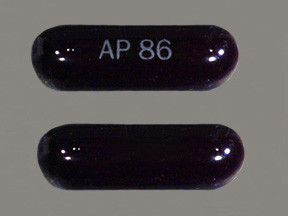
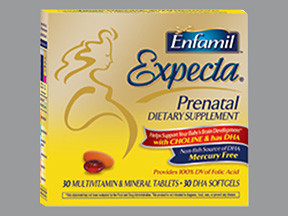
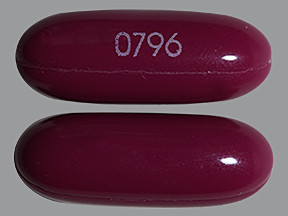
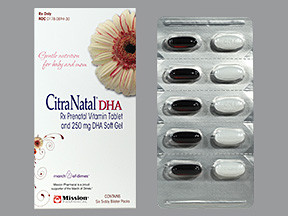
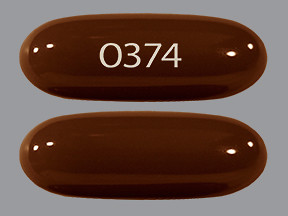
No Reviews Yet